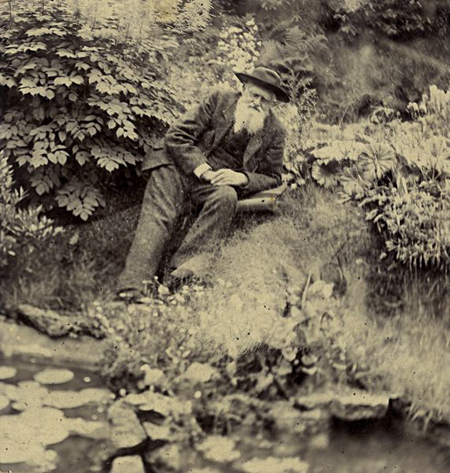This letter (WCP3536) was written on 16 August 1892, when Wallace was 69 years old, to Henry Deane.
Deane, an engineer who was born in London in 1847, had emigrated to Australia in 1879 and was responsible for electrifying the Sydney tramway system, and for building the Wolgan Valley Railway and Trans-Australian Railway. Deane graduated from Queen’s College, Galway, with honours in mathematics and natural sciences and later in life was twice president of the Royal Society New South Wales and was also president of the Linnean Society of New South Wales.
Wallace had found his name in a list of Linnean Society members living abroad and wrote to Deane in part to tell him how he recalled many happy evenings spent in Clapham Common with his mother and father - a chemist also called Henry. However, Wallace’s chief objective for writing this letter was not to reminisce, it was to source orchids. He had even included a set of guidelines entitled, "Instructions for packing & sending Terrestrial Orchids for cultivation."

Wallace in his garden at Parkstone, Dorset in 1895. © Wallace Memorial Fund and G.W. Beccaloni
Orchids and gardening - whilst allowing us an insight into Wallace’s personal life through his hobbies - are not the reasons I selected this piece as the letter of the month. The reason for selecting this letter, is because of its very last line, where Wallace writes:
"There is, I presume, a great future for Electricity in all parts of the world and in many yet undiscovered applications."
This closed the last paragraph of the letter, which was devoted to writing about his son, William, who had just qualified as an electrical engineer. With Deane himself being an engineer, he would no doubt have been interested in this little snippet of information.
However, that last sentence above really caught my eye and made stop and think just how different a world we are living in to the world Wallace inhabited and just what would he make of where we are scientifically and technologically today. I think he’d have some pretty strong opinions about both!
To give some context, the world in which Wallace lived in in 1892 was not without electricity. The electric motor had been invented over 70 years previously in 1821 by Michael Faraday, the first intelligible phone communication took place in 1875; 1879 was the year Edison invented the light bulb and it only took two years from there for electric light to be used in a domestic setting, albeit most probably a rich domestic setting. Electrification of trams in England happened in the 1890s and Marconi made significant strides in radio telegrahy and transmission.
So, the world was not without electricity. However, there were no televisions, no computers, no smartphones, no tablets, no hair straighteners, no electric cars, no electric fridges, no dishwashers, no commercial air travel… well you get the idea!
Now, I’m not qualified to judge what the best electrical innovation has been since Wallace made this statement in 1892, but I’d say computers have got to be up there competing for first place. What would Wallace make of them? What would he say about the internet, about social media, even about me writing this blog about a letter he sent to Australia in 1892?! And the fact that this letter has now been digitised and is available to read on the internet. Would he care?
I think he would. I think the fact that he wrote that sentence means he would care and take an immense interest in electrical and technological innovation over the last 100 years since his death. He was an inquisitive man who, as we well know, did not confine himself to simply studying the natural world. To use a well-known phrase, he had his fingers in many pies and our very different way of living would probably delight and horrify him in equal measures. He would, I think, appreciate how easy it is to disseminate information to mass audiences today in order to educate, and how easy it is to obtain information for research from an online scholarly journal (EPSILON is full of letters where he asks the recipient to send him a particular journal article he can’t obtain).
What would horrify him would be something that he actually wrote about 4 years before his death in 1909. He wrote to the Daily News a cautionary letter in response to receiving a programme entitled, "Aerial League of the British Empire" whose aim was to "To secure and maintain for the Empire the same supremacy in the air as it now enjoys on the sea" and Wallace urged the government in this open letter, "to dissociate itself from this proposed crime against humanity it is now. If ever there was a time when we should take the initiative against adding this new horror to the horrors of war (which all civilized Governments profess to be eager to diminish) it is now."
The way he wrote about such things shows what great foresight and intellect he had and also how incredibly sensible he was. It is perhaps a good thing he died before he witnessed the atrocities inflicted by aeroplanes and "flying machines" in the two World Wars and beyond into the present day.
-Caroline-


Add new comment